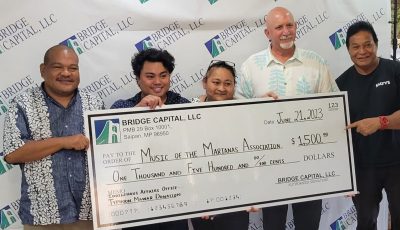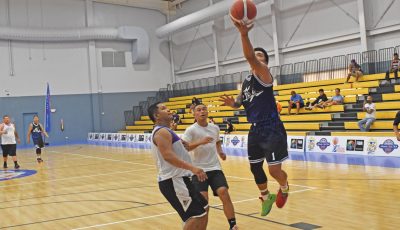Kennedy denies Laos’ petition for subpoenas on Bridge Capital, Baldwin
The federal court has denied the petition of the Government of the Lao People’s Democratic Republic for issuance of subpoenas to be served on Bridge Capital LLC and its co-owner John K. Baldwin and others in connection with the criminal tax investigations in Laos and international proceedings pending in Singapore.
U.S. District Court for the NMI Magistrate Judge Heather L. Kennedy ruled that the Government of the Lao People’s Democratic Republic (GOL) is a sovereign nation, and may prosecute its laws and interpret its agreements as it sees fit.
“But this court is not required to help,” said Kennedy in a 19-page decision issued on Thursday.
Kennedy granted Bridge Capital’s motion to strike GOL’s supplemental evidence for failure to comply with the court’s local rules.
While the court placed the matter under advisement, GOL submitted supplemental evidence in support of its position.
Kennedy also denied GOL’s motions for leave to file supplemental evidence.
According to court records, GOL filed an application to obtain discovery from Bridge Capital LLC, Baldwin, then-Bridge Capital chief financial officer David Jensen, and First Hawaiian Bank on Saipan, for use in private international commercial arbitration and its own criminal bribery and tax evasion investigation.
Kennedy heard the motion last Dec. 7 and placed it under advisement.
According to court records, GOL’s petition relates to the ongoing breakup of its partnership with Sanum Investments Limited and Lao Holdings, N.V. over the Savan Vegas, a casino and resort in Laos.
Baldwin owns 50 percent of the shares of Lao Holdings, a Netherlands entity, which in turn is the sole owner of Sanum Investments, an entity organized under the laws of the Special Administrative Region of Macau, China,
The Savan Vegas was a joint venture in which Sanum Investments and Lao Holdings owned 80 percent of the casino and GOL owned the remaining 20 percent.
The parties disagreed over the nature of Bridge Capital’s connection to the Savan Vegas. GOL asserts that Bridge Capital is funding Sanum’s investments in Laos, but Bridge denies the charge.
Jensen was the chief financial officer of Bridge Capital at the time GOL filed its application, but he has since left the company. First Hawaiian Bank is Bridge Capital’s bank.
The Savan Vegas partnership began in 2007. In connection with Sanum and Lao Holdings’ investments, GOL granted several benefits to the Savan Vegas, including a low flat tax rate and a monopoly on casino gambling in its area of operation.
However, by 2012 the parties found themselves in disagreement regarding many aspects of the arrangement. Sanum and Lao Holdings filed arbitration complaints pursuant to bilateral investment treaties between GOL and China, and GOL and the Netherland, respectively.
In June 2014, the parties settled the bilateral investment treaty arbitrations. The settlement agreement called for Sanum and Lao Holdings to sell off their interest in the Savan Vegas while allowing those entities to escape certain tax liabilities alleged by GOL.
Furthermore, the agreement specified that GOL “shall discontinue the current criminal investigations against Sanum/Savan Vegas and its management or other personnel and shall not reinstate such investigations provided that the terms and conditions agreed herein are duly and fully implemented by [Sanum and Lao Holdings].”
However, shortly after the agreement was finalized, Sanum and Lao Holdings attempted to reopen the bilateral investment treaty arbitration, alleging that GOL had materially breached the settlement agreement.
For its part, GOL initiated a separate arbitration in the Singapore International Arbitration Centre pursuant to the settlement agreement itself.
Sanum and Lao Holdings were unsuccessful in their bid to reopen the bilateral investment treaty arbitration.
But in November 2015, Sanum and Lao Holdings sent a letter to GOL warning that another attempt would be made if GOL refused to comply with the terms of the settlement.
The record does not indicate that Sanum and Lao Holdings followed through on the threat. Bridge Capital declined to say at oral argument whether a revival of the bilateral investment treaty arbitration would actually be sought.
Meanwhile, the Singapore International Arbitration Centre is pending, and GOL reinitiated its criminal bribery and tax evasion investigation.
GOL seeks discovery from federal court to use in conjunction with the Singapore International Arbitration Centre arbitration and its criminal bribery and tax evasion investigation.
GOL argues that it is entitled to the discovery under the United Nations Convention Against Corruption and 28 U.S.C. Section 1782.
Bridge Capital makes three principal arguments against GOL application.
Bridge Capital argues that the Convention does not grant a freestanding right to discovery, but rather applies through Section 1782.
Bridge Capital argues that the application fails to satisfy the threshold requirements of that statute.
Bridge Capital argues that discretionary factors weigh against granting discovery in this case.
Kennedy agrees with Bridge Capital.
Kennedy said the U.N. Convention Against Corruption grants no independent right to discovery.
Kennedy said GOL didn’t meet the requirements of the statute.
The magistrate judge cited that the district court may order discovery if three conditions are met.
First, she said, the person or entity from whom discovery is sought resides in or can be found in the court’s district.
Second, Kennedy said, the application is made by a foreign or international tribunal or “any interested person.”
Third, she said, the discovery is “for use in a proceeding in a foreign or international tribunal, including criminal investigations conducted before formal accusation.”
Kennedy said there is no question that the first two statutory elements of GOL’s Section 1782 application are satisfied: Bridge Capital, FHB, Baldwin, and Jensen can all be found within the district.
Kennedy said GOL, as party to the Singapore arbitration and the prosecuting authority in the criminal investigation, certainly qualifies as an “interested person.”
Kennedy said her opinion focuses on the third element: whether the discovery will be “use[d] in a proceeding in a foreign or international tribunal, including criminal investigations conducted before formal accusation.”
Kennedy said she finds that GOL can satisfy neither the “international tribunal” requirement for Singapore International Arbitration Centre, nor the “use” requirement for the alleged criminal investigation or the bilateral investment treaties arbitration.
Kennedy said private arbitral bodies are not “foreign or international tribunals” for purposes of Section 1782.
Kennedy said because the Singapore International Arbitration Centre is a private arbitral body, the court lacks the statutory authority to order discovery for use in the Singapore proceeding.
Accordingly, Kennedy said, to the extent that GOL’s discovery application rests on the proceedings before the Singapore International Arbitration Centre, it is denied.
Kennedy said GOL’s discovery application is not “for use” in a foreign or international tribunal or criminal investigation under Section 1782.
Kenney said in sum, she finds that the discovery sought with respect to the GOL criminal investigation and the purely speculative bilateral investment treaty arbitration revival fails to satisfy Section 1782’s requirement that it be “for use in a proceeding in a foreign or international tribunal, including criminal investigations conducted before formal accusations.”
Kennedy said discretionary factors also weigh against GOL’s application.
Kennedy said despite the failure of the settlement to actually resolve the issues facing the Savan Vegas, the parties agreed to be bound by its terms, including non-prosecution.
To be clear, Kennedy said, no neutral arbiter—neither bilateral investment treaty nor Singapore International Arbitration Centre—has yet ruled on the breach claim or permitted either side to escape its obligations.
“But that has not stopped GOL from reinstating the investigation against Baldwin and the other owners and managers of the Savan Vegas,” the magistrate judge pointed out.




























